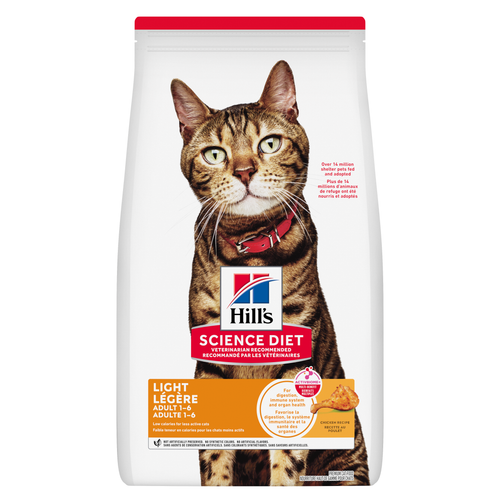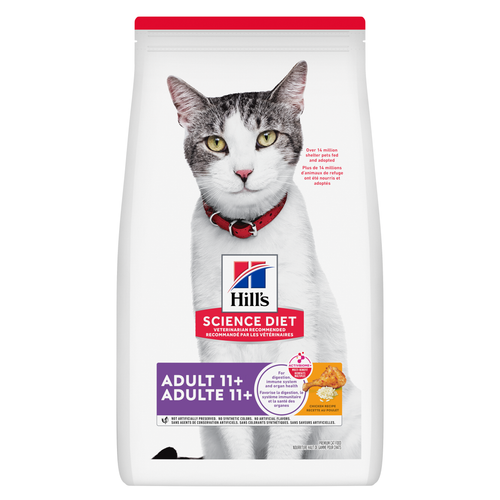
-
Find the right food for your petTake this quiz to see which food may be the best for your furry friend.Find the right food for your petTake this quiz to see which food may be the best for your furry friend.Featured products
 Adult Light Large Breed Chicken Meal & Barley Recipe Dog Food
Adult Light Large Breed Chicken Meal & Barley Recipe Dog Food18% lower calories vs. Science Diet Large Breed Adult
Shop Now Adult Healthy Mobility Small Bites Chicken Meal, Barley & Brown Rice Recipe Dog Food
Adult Healthy Mobility Small Bites Chicken Meal, Barley & Brown Rice Recipe Dog FoodAdvanced nutrition to support hip & joint health from day 1
Shop Now Adult Sensitive Stomach & Skin Small & Mini Chicken Recipe Dog Food
Adult Sensitive Stomach & Skin Small & Mini Chicken Recipe Dog FoodHill's Science Diet Sensitive Stomach & Skin Small & Mini dry dog food is tailored nutrition for Small & Mini dogs while being gentle on stomachs. Nourishes skin & promotes a lustrous coat.
Shop NowFeatured products Adult Light Chicken Recipe Cat Food
Adult Light Chicken Recipe Cat Food20% lower calories vs. Hill's Science Diet Adult
Shop Now Adult Healthy Cuisine Seared Tuna & Carrot Medley Cat Food
Adult Healthy Cuisine Seared Tuna & Carrot Medley Cat FoodDelicious seared tuna paired with tender carrots in a mouthwatering sauce
Shop Now Adult 11+ Chicken Recipe Cat Food
Adult 11+ Chicken Recipe Cat FoodSupports brain health & beautiful fur. Helps keep immune system, heart & kidneys healthy.
Shop Now -
Dog
- Dog Tips & Articles
-
Health Category
- Weight
- Food & Environmental Sensitivities
- Urinary
- Digestive
- Joint
- Kidney
- Dental
- Cancer
-
Life Stage
- Puppy Nutrition
- Adult Nutrition
- Senior Nutrition
Cat- Cat Tips & Articles
-
Health Category
- Weight
- Skin & Food Sensitivities
- Urinary
- Digestive
- Kidney
- Dental
- Stress
- Cancer
-
Life Stage
- Kitten Nutrition
- Adult Nutrition
Featured articles Importance of DHA in your Pet's Food
Importance of DHA in your Pet's FoodLearn about DHA, Docosahexaenoic Acid, a natural omega-3 fatty acid that is essential in the development of the brain and nervous system in cats & dogs.
Read More Water
WaterDiscover why water is the most important nutrient for your dog or cat to live a healthy life. Find out how much water your pet should consume each day.
Read More Antioxidants
AntioxidantsUnderstand the importance of antioxidants in your dog or cat's food, and how they can help protect your pet and keep them healthy.
Read More -


If you're a dog parent, you might find your dog peeing blood at some point. But, while blood in dog urine is a scary sight, it's often a sign of something treatable. A simple urinary tract infection or a benign prostate problem can be the cause.
Hematuria is a term used to describe when blood appears in a dog's urine. This is often due to inflammation or infection in the urinary system which could include the upper or lower urinary tract. The presence of blood in the urine or hematuria should be evaluated by your veterinarian to identify the cause and provide recommendations to help your dog.
Here are common causes of blood in dog urine, what you should do if it affects your dog and the treatments your veterinarian may recommend.
Key Takeaways
-
Two of the most common reasons that blood might show up in your dog’s urine involve kidney and bladder issues like infections, stones, and other problems.
-
IMPORTANT: It’s generally recommended that a dog with blood in their urine should be seen by a veterinarian within 24 hours.
-
Monitoring your dog’s urinary habits is an important part of checking on their overall health.
Upper Urinary Tract Causes
As in humans, a dog's upper urinary tract contains two kidneys. Blood in urine originating in this part of the urinary tract tends to affect the kidneys. Some causes for bleeding in the upper urinary tract include:
- Idiopathic renal hematuria: This is blood in the urine that results from the kidney for an unknown reason. It could be due to medicine, an infection or an issue with the immune system. This is generally considered a benign condition with a hereditary element.
- Kidney infection: If your dog is peeing blood, one or both of your dog's kidneys could possibly be infected.
- Kidney stones: While uncommon, kidney stones can affect one or both kidneys resulting in the presence of blood in the urine.
- Kidney cancer: While uncommon, kidney cancer can affect dogs and cause blood in dog urine. The cancer can remain in the kidney or spread to other parts of the body.
- Renal telangiectasia: Some dogs, such as Welsh corgis, have a genetic predisposition to this spontaneous widening of blood vessels in the kidney, which can lead to blood in their urine.
Lower Urinary Tract Causes
The lower urinary tract includes the bladder and the urethra, the tube that connects the bladder to the outside world and allows urine to exit the body. Causes for bleeding here include the following:
- Bladder infection: A lower urinary tract infection (UTI) is by far the most common cause for a dog peeing blood. It can be caused by skin allergies; the anatomy of the urethra, vulva or prepuce; and hormone-related incontinence in spayed females
- Bladder stones: These can form for a variety of reasons, including genetics, nutrition and chronic infection.
- Bladder cancer: Bladder cancer in dogs often looks similar to a UTI; it can cause accidents in the house, difficulty urinating and blood in the urine.
- Prostate problems: Benign prostate enlargement and prostate infection are the most common prostate problems in male dogs who haven't been neutered.
Causes for blood in dog urine that can affect both the upper and lower urinary tracts include a ruptured bladder, which can happen if they're hit by a car or attacked by another dog; coagulopathy (a scientific word that essentially means clotting problems); and vasculitis, or inflammation of the blood vessels.


Tasty Tips
Since our first pet food in the late 1930s, we’ve set out to create differences you can see, feel and trust.

Taking your dog for regular veterinary checkups is the best way to prevent blood in their urine and other urinary problems.
Diagnosis and Treatment
If you see your dog peeing blood, contact your veterinarian to make an appointment as soon as possible. As a general rule, any dog peeing blood for the first time should be seen by a veterinarian within 24 hours.
At the visit, the veterinarian will try to diagnose the underlying cause of the blood by analyzing your dog's urine. A urine culture may be recommended to see if bacteria might be causing the issue. They may also conduct a blood test or take an X-ray or an ultrasound.
Treatment depends on the specific cause of the blood. The veterinarian may prescribe antibiotics if the issue is related to bacteria. In cases of benign prostate enlargement and prostate neoplasia, they are likely to recommend neutering. Sometimes bloody urine may be caused by bladder stones, of which there are several types. Veterinarians commonly prescribe anti-inflammatory or pain medicine to ease dogs' discomfort.
Your veterinarian may also recommend a change in food. Nutrition is an important component in managing urinary tract problems in dogs. Wet foods can help achieve more dilute urine, and certain foods can reduce stone formation and optimize urine pH.
Preventing Future Urinary Problems
Taking your dog for regular veterinary checkups is the best way to prevent blood in their urine and other urinary problems. Your veterinarian can tell you if your dog is predisposed to urinary issues. If they are, the veterinarian can routinely test your dog's urine to make sure they're in tip-top health.
Also, while it may be easy to just let your dog in the backyard to do their business alone, monitoring your dog's urinary habits occasionally is a necessary part of being a dog parent. Letting an issue like blood in the urine persist can lead to more serious consequences. You are your dog's first line of defense to their health, so careful monitoring and discussions with your veterinarian are pertinent. With love and attention, you can help keep your dog happy and healthy.


Dr. Patty Khuly is an award-winning veterinarian known for her independent thinking, her spirited pet advocacy, her passion for the veterinary profession, and her famously irreverent pet health writing.
Dr. K is an honors graduate of both Wellesley College and the University of Pennsylvania School of Veterinary Medicine. She received her MBA at The Wharton School of Business as part of the prestigious VMD/MBA dual-degree program. She now owns Sunset Animal Clinic, a veterinary practice in Miami, Florida.

See what Vets have to say
Read reviews from the experts and see why Hill's is the #1 Veterinarian Recommended brand.
See what Vets have to say
Read reviews from the experts and see why Hill's is the #1 Veterinarian Recommended brand.




